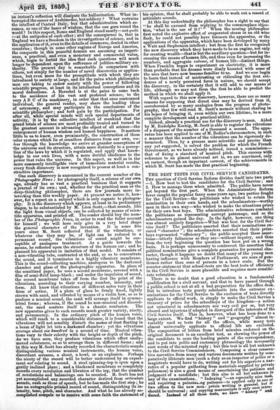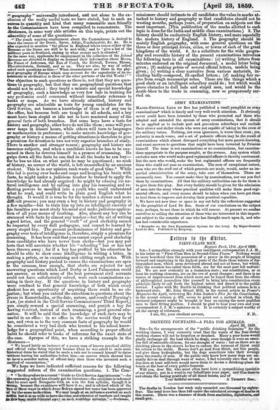THE BEST TESTS FOR CIVIL SERVICE CANDIDATES. THE question of
Civil Service Reform divides itself into two parts —1. How best to test the candidates for the Civil Service ; and 2. How to manage them when admitted. The public have never got beyond the first part. When the Administrative Reform fever caught the popular fancy some years ago, two parties fought for the Civil Service—the politicians who wished to retain the nomination in their own hands, and the schoolmasters—worthy men in their own way—who wished to make the situations prizes for their own best boys. The administrative reformers combated the politicians as representing corrupt patronage, and so the schoolmasters gained the day. In the fight, however, one thing was almost entirely forgotten—What was best for the Civil Ser- vice itself ? The politicians asserted that their nominations en- sured " character " ; the schoolmasters asserted that their prize- boys represented " efficiency " ; the public accepted these asser- tions—utterly fallacious as they are—without inquiry, and thus from the very beginning the question has been put on a wrong basis. It is perhaps unnecessary to controvert the assertion that political nominations give a complete guarantee for personal cha- racter, though it happens no doubt that many of the young men having influence with Members of Parliament, are sons of gen- tlemen rather than sons of persons in a lower scale. But the counter-statement that school-tests are the best tests of efficiency in the Civil Service is more plausible and requires more conside- rate refutation.
There is no doubt that a good education is a fundamental qualification for a civil servant, and that to have passed through a public school is not at all a bad preparation for the office desk. But to introduce tests purely scholastic into the entrance ex- aminations for the Civil Service to the exclusion of tests directly applicate to official work, is simply to make the Civil Service a treasury of prizes for the schoolboys of the kingdom—a notion not unnatural in schoolmasters nor very evil per se, but very absurd and injurious if adopted in disregard of the interests of the Civil Service itself. This is, however, what has been done to a large extent. We find " history " and " geography" almost in- variably used as tests for all the offices, while many tests almost universally applicate to official life are excluded. The composition of letters from brief minutes endorsed on the original document is an excellent test, as showing the power of the candidate to seize the leading points of the correspondence, and to put into polite and customary phraseology the necessarily curt words of the minuted reply ; but this test is all but unknown to the Civil Service Commissioners. Composing a clear consecu- tive narrative from many and various documents written by com- paratively illiterate men (such a duty as an inspector of police or a magistrate would have to do, writing out for his superiors a nar- rative of a popular gathering from materials supplied by private policemen) is also a good means of ascertaining the patience and judgment of a candidate; but this also is all but unknown in any of the examinations. " Indexing "—an especially nice task, and requiring a painstiasig patience—is applied only in one or two offices to the new men : précis writing is general, but1and ut it should be universal ; and copying manuscripts is only onee,r duced. Instead of all these tests, we have history 44 geography" universally introduced, and not alone to the ex- clusion of the really useful tests we have stated, but to such an excess in quantity and kind that many reasonable men friendly to the Commissioners have been compelled to remonstrate. The Scotsman, in some very able articles on this topic, points out the absurdity of some of the questions- " The youth wanting employment about the Customhouse is desired to trace the course of the Drave, Spree, Adige, Guadalquivir, &c. &c. He is also expected to mention ' the places in England where traces either of the Romans or the Danes are still to be met with,' and to ' give a list of the military posts in Scotland, stating in what county each is situated.' . . . . In the same way, applicants for employment in the collection of the Inland Revenue are directed to display on demand their information about Mecca, the Forest of Ardennes, the Run of Cutch, the Kistrall, Tornea, Shassa, Ehrenbreitstein, Zermatt, and so on. They are also, by way of relief, asked such questions as this—' What circumstances are there in the phy- sical geography of Europe which may account for the superiority of its in- habitants in civilization to those of the other portions of the Old World ? ' " Our objection to such questions as these is, not that they are ques- tions in geography, but that they are geographical questions that should not be asked : they imply a minute and special knowledge of geography, such a knowledge as very few lads in training for
di
any profession could command without immediate reference to books or maps. As we have already admitted, history and geography are admissible as tests for young candidates for the Civil Service, not because a knowledge of them is of any, use in the office, but because both are taught in all schools, and a boy must. have been stupid or idle not to have mastered many of the general facts of both.branches. But some boys have a taste for history and geography, other boys do not like them ; some will pore ever maps in leisure hours, while others will turn to languages or mathematics in preference ; to make minute knowledge of geo- graphy or history a means of getting situations is therefore to give a premium for devotion to two not very superior branches of study. There is another and stronger reason • geography and history are immense subjects, and when a candidate knows he has to be exa- mined in them he devotes himself to a proeess of cramming. He .gulps down all the facts he can find in all the books he can buy- -for he has no idea on what point he may be questioned ; no nook .af history, no corner of the world, is left unsearehed by an anxious student. This is in our opinion rank waste of good time.* While this lad is poring over books and maps and heaping his brain with facts, he might under a judicious teacher be trained-to apply the .knowledge he had already acquired : he might by educing his na- tural intelligence and by calling into play his reasoning and re- -fleeting powers be moulded. into a youth who could understand what he read, and could write in plain good English what he :thought. It would it is true be for the teacher a slower and more diffinilt process ; you may cram a boy in history and geography in
a i few months—but to train him up into an intelligent exercise of
his faculties you must study his mind and make judicious applica- tion of all your means of teaching. Also; almost any boy can be crammed with facts by almost any teacher—but the art of writing agood letter, and the general " craft " of good clerkship cannot be imparted by every dull pedagogue, and cannot be learned by every stupid boy. The present predominance of history and geo- graphy over tests of intelligence is, therefore, simply a premium for cramming. It has been said that you cannot expect good clerkship from candidates who have never been clerks—but you may put tests that will ascertain whether his " schooling " has or has not been thrown away; for if a boy, has profited by his education he should be able to show some intelligence in writing a letter in making a précis, or in examining and editing rough notes. With geography and history pushed to excess the examinations are open to the sarcasm, true enough, that clerks are rejected for not answering questions which Lord Derby or Lord Palmerston could not answer, or which some of the best permanent civil servants could not have satisfactorily solved, were such examinations ex- isting in their day. If the questions in history and geography were confined to that general knowledge of both which every student has an opportunity of acquiring there could be no ob- jection ; but when you extend the catechism to questions about the rivers in Kamstchatka, or the date, nature, and result of Poyning's Law, cal stated in the Civil Service Commissioners' Third Report,) you simply reward a special cramming, and punish a boy for having received, instead of such cramming, a good general edu- cation. It will be said that the knowledge of such facts may be useful in an office : in no office in the service would they be of use, and even as to the very common facts of geography he would be considered a very bad clerk who trusted to his school know- ledge for a geographical point, when according to proper official habit he should refer to books of reference for the exact state of the ease. Apropos of this, we have a striking example in the Scotsman- " We heard lately an instance of a young man of known practical ability and official value being rejected because when he was asked to state some historical dates he stated that he made a rule not to commit himself to dates without having his authorities before him—an answer which showed him to have a sounder notion of official duty than those who invented such a method of examination."
We hope we have indicated sufficient reasons for the following
suggested reform of the examination 'questions. 1. The Com- _ * " In the preface to a recent" Guide to Civil Service Appointments "—for the cramming school has already got its literature—the candidate is informed that he must spell Bonaparte with an a in the flint syllable, though it is :wrong, because the examiners will have it so; and is advised which of the two or three ways in which Anne Boleyn signed her name has been approved of by the same authorities. We may laugh at an influence-exerted on such trifles. but it is no trifle to have the time and attention of teachers and taught in this busy.tvorld.fritternd away on such worthless minuti,a.t."-78cotamon., missioners should intimate to all candidates the value in marks at- tached to history and geography so that candidates should not be wasting months, perhaps years, of preparation on subjects not the most important. (This publication of the marks allotted to each topic is done for the India and middle class examinations.) 2. The history should be exclusively English history, and more especially the modern history of England. 3. The geography should be mainly English geography, with some general questions on the three or four principal rivers, cities, or towns of each of the great kingdoms of the world. 4. As a substitute for the wide geogra- phy and recondite history of the present examinations introduce the following tests in all examinations : (a) writing letters from minutes endorsed on the original document, a model letter being given; b) making précis of several official letters, models being given ; c) writing a clear narrative from various materials, in- cluding adly-composed, ill-spelled letters ; (d) making fair co- pies from rough manuscript notes. These are the things which a good clerk or an intelligent schoolboy could do ; but which would prove obstacles to dull lads and stupid men, and would be the death-blow to the trade in cramming, now so prosperously car- ried on.



























 Previous page
Previous page